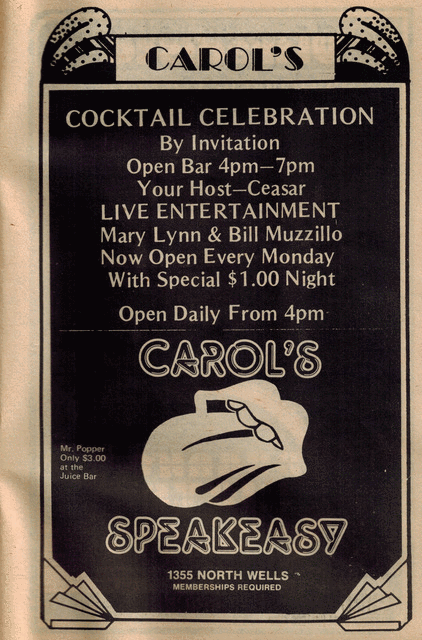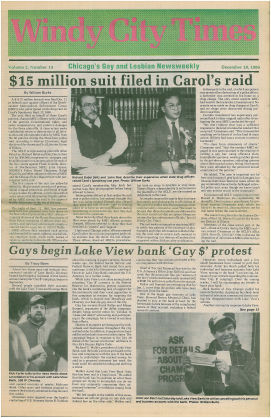BijouBlog
September 12, 1985: Remembering the Infamous Carol's Speakeasy Raid in Chicago
posted by Madame Bubby
The raid on Stonewall of course has become an iconic event because of its social and historical ramifications, but recently LGBTQ historians, including many who publicize history on social media platforms such as Twitter, have called attention to similar events before and after Stonewall. Often the goal of such histories is uncovering marginalized narratives of oppression and liberation that can frame our own interpretations of not just those people and events, but also give a valued context for the present-day legal, social, and cultural challenges to honor and justice that LGBTQ persons still face.
One raid which attained notoriety, mostly because it showed how the politics of the gay Chicago community was becoming very much intertwined overall with mainstream politics, occurred on September 12, 1985.

A group called NEMEG, Northwestern Metropolitan Enforcement Group, which consisted of officers from various north and northwestern suburbs, raided a popular gay bar, Carol's Speakeasy, located at 1355 N. Wells Street (that strip still at that point in LGBTQ Chicago history was the center of a vibrant gay nightlife). NEMEG was ostensibly looking for evidence of drugs and drug dealing.
According to David Boyer of Touche and Bijou and a noted figure in Chicago's gay community, who was then employed by Carol's (his first year as manager), the bar was hosting a wrestling promotion night: “We had put out mats on the dance floor and guys would challenge each other to wrestle. Had about maybe 50 or so people in the house.”
Also according to David Boyer, whose account I quote and paraphrase for much of this blog and which generally corroborates what even the conservative Chicago Tribune reported, the Chicago police were not involved; and, as one shall see, this is a most significant, telling detail.
David describes how this, I would claim, vigilante group “stormed the front door, guns drawn,” and that they also broke in through the back. These persons were not wearing any type of identifying uniform, and did not even identify themselves.
Everyone in the bar was forced to gather together and lay face down on the dance floor for a period of several hours. NEMEG members would hit or shove the face of anyone back down to the floor if they even unintentionally looked up.
NEMEG meanwhile searched the offices and serving areas behind the bars, looking for drugs. David mentions that they were even throwing around match books, claiming these contained packages of drugs.
In a manner reminiscent of pre-Stonewall raids, these persons took each person, questioned them, and, most significantly, photographed them. Everyone eventually was forced to leave the bar; no one was arrrested. David Boyer refused to leave after identifying himself as the manager, but they still did not inform him of their identity.
After what seemed an interminable time of chaos and violence, Chicago police did show up, but they did nothing to stop what was happening. Nothing; one could claim they were deliberately ignoring the many legal violations that were occurring for reasons ranging from homophobia to some unwritten code that forbade them from “telling” on their suburban officer comrades.
NEMEG did claim they found drugs on the premises, but they could not determine who brought them.
According to David, at the same time the raid occurred, a couple of employees were arrested at their homes and charged with drug dealing.
This incident did not end up being a narrative memory of injustice and degradation.
By the middle 1980s, the gay community in Chicago had gained enough political power, even during this uncertain time when AIDS was beginning to decimate its members.
Thus, those affected by this raid filed a civil lawsuit against these suburban officers, focusing on clear violations of the law, such as not identifying themselves as police and forcibly taking photographs of the bar patrons.

According to a report in the September 16, 1986 of the Chicago Tribune:
"This is one of the most massive violations of civil rights we have seen in Chicago in the last decade," said Harvey Grossman, Illinios legal director of the ACLU.
"Over 50 men were subjected to this course of conduct. They were all ordered to lie on the floor; they were subjected to illegal searches; they were interrogated against their will and required to disclose information about their backgrounds; they were all photographed and none was arrested.
"What the agents did was to take the occasion of serving an arrest warrant on the bartender and turn it into a raid on all who were present at the time," Grossman said.
By 1989, the parties reached an accord, according to a report in the August 18, 1989 issue of the Chicago Tribune. Harvey Grossman in this article makes a telling point: "Although gays have long been subject to police harassment, this is the first time a group of gay men has successfully joined together to obtain damages from law enforcement agencies," Grossman said.
The above is a story of injustice, but also a story of moral courage and faith that the justice system does indeed work, even against those who are supposedly responsible for upholding that its laws are enforced equitably and honorably. In this case, the human rights of the manager and patrons of Carol's were dishonored and dehumanized that night, and though the terms of the settlement did include financial compensation, the real issue is that no one is above the law, and this law is based on the premise that persons are innocent until proven guilty.
Currently, one cannot assume in the case of vulnerable, marginalized populations that their human rights will be respected, and that the justice system will uphold them. I think it's important, overall, to frame this raid as a #NeverAgainIsNow moment that the LGBTQ communities need to take to heart, not only as a warning, but as call for persons to emulate the moral courage David Boyer showed that night.
Sources: Chicago Tribune reports (see hyperlinks); eyewitness account from David Boyer received via email; https://slate.com/human-interest/2016/02/queer-clout-in-chicago-telling-gay-history-beyond-stonewall-and-the-castro.html
When you subscribe to the blog, we will send you an e-mail when there are new updates on the site so you wouldn't miss them.

Comments